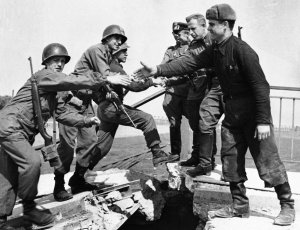
 U.S. and Russian troops meet on the wrecked bridge over the Elbe River at Torgau, Germany, April 26, 1945. The Americans, left, and Russian soldiers are shown as they reach out to grasp each other’s hands. (AP Photo)
U.S. and Russian troops meet on the wrecked bridge over the Elbe River at Torgau, Germany, April 26, 1945. The Americans, left, and Russian soldiers are shown as they reach out to grasp each other’s hands. (AP Photo)
This week can mark the start of a similar effort by the two nations to destroy the most brutal common enemy of our day - this time in Syria.
According to the State Department, "The United States of America and the Russian Federation, as co-chairs of the International Syria Support Group (ISSG) and seeking to achieve a peaceful settlement of the Syrian crisis with full respect for the fundamental role of the United Nations, are fully determined to provide their strongest support to end the Syrian conflict and establish conditions for a successful Syrian-led political transition process, facilitated by the UN.”
Putin responded in kind, saying that "I am sure that the joint actions agreed upon with the American side will be enough to radically reverse the crisis situation in Syria. We are finally seeing a real chance to bring an end to the long-standing bloodshed and violence….Against this background, Russian-American agreements on the cessation of hostilities in Syria, and their joint implementation in coordination with all nations participating in the International Syria Support Group, can become an example of responsible actions the global community takes against the threat of terrorism, which are based on international law and UN principles.”
Finally, it sounds like the two sides are talking real business instead of exchanging insults, name calling and threats.
This is what the American and Russian people have been expecting from their leaders but let us not get too excited in order not to be highly disappointed, as we had been too often in the past with the Obama-Clinton "reset” and other empty rhetoric.
There are many powerful forces who are not interested in US - Russia military and security cooperation. Only last week Secretary of Defense Ash Carter placed Russia at the top of the list of U.S. security threats. His statement was matched by Prime Minister Dmitry Medvedev when he described the present international environment as a full-blown "Cold War.”
The media is also playing a very negative role in escalating tensions. Former ‘New York Times’ correspondent Stephen Kinzer, who is now a senior fellow at the Watson Institute for International Studies at Brown University, writes in ‘The Boston Globe’ that "Coverage of the Syrian war will be remembered as one of the most shameful episodes in the history of the American press which is reporting the opposite of what is actually happening.”
The same day as the aforementioned joint US – Russia agreement on Syria was confirmed ‘The New York Times’ already predicted its failure and blamed this on Putin, of course.
And according to ‘The Wall Street Journal,’ Obama’s top military and intelligence advisers are pushing for ways to increase pressure on Moscow, including expanding covert military assistance for some rebels now taking a pounding from Russian airstrikes.
Even Kerry, when facing skeptical lawmakers of the Senate Foreign Relations Committee, referred several times to a "Plan B” alternative to diplomacy and said "this could get a lot uglier” for Russia if the agreed-upon process fails.
However, even those who do not want to support the US - Russia rapprochement cannot deny that the only way to stop the bloodshed in Syria and eventually eliminate ISIS is for US and Russia to work together.
It is time to listen to people like former Reagan’s speech writer Congressman Dana Rohrabacher (R-CA) when he says that "We must cast aside such absurd, costly, unachievable and un-American ambitions that would have us policing and garrisoning the planet, intervening in every conflict. We must favor a policy that cultivates mutually beneficial relations with nations of like culture and values, negotiating smartly in the national interest- all, of course, while maintaining a defensive military posture second to none. America was conceived as a strong and healthy Republic, not a vitality-draining empire.”
Edward Lozansky is president of the American University in Moscow, Professor of Moscow Sate and National Research Nuclear Universities



_jpg/250px-ElbeDay1945_(NARA_ww2-121).jpg)





